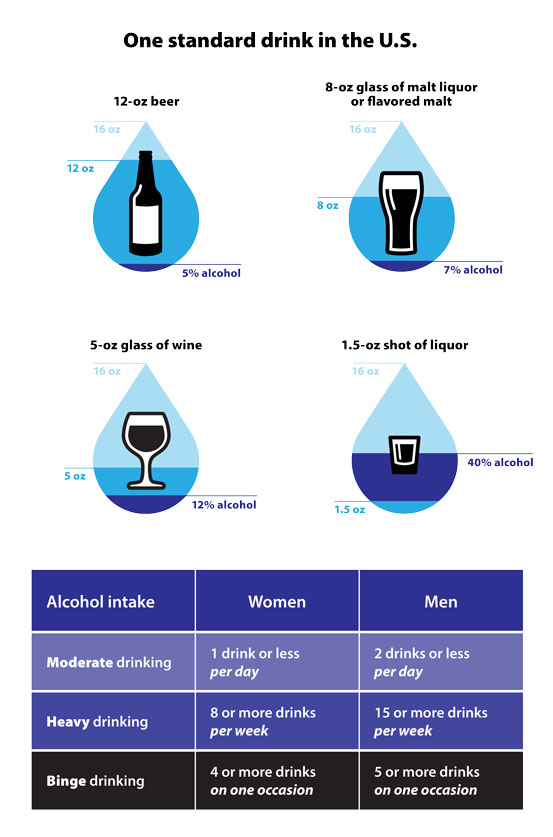Excessive alcohol consumption poses a serious risk to military health and performance. Between immediate and long-term consequences, drinking too much can degrade your performance in all areas of Total Force Fitness (TFF)—mental, social, physical, financial, spiritual, medical, environmental, and nutritional fitness.
When you drink above the healthy limits, alcohol can affect your well-being and total fitness.
- Impairs your speech, memory, coordination, and balance
- Worsens or contributes to mental health disorders
- Affects your relationships
- Increases the risk of accidents and injury
- Becomes a financial burden
- Contributes to chronic health problems such as cancer, liver, and cardiovascular diseases
When it comes to alcohol, the dose makes the poison. The common (and informed) advice says that if you drink alcohol, do so in moderation. What does moderate and excessive drinking look like and how can you take control of your alcohol intake?
Learn the numbers
The first step in setting a limit on alcohol consumption is learning how much is too much. It’s common for someone to say, “I feel just fine,” after they drink a whole bottle of wine. Still, alcohol impairs judgement, so it’s safer to rely on facts vs. what something might seem or look like. The image below sets the numbers around moderate, heavy, and binge drinking. Use these numbers to help you consume alcohol in a way that doesn't impact military health and performance.

There are multiple groups of people who should completely abstain from alcohol.
- Pregnant women
- Anyone younger than 21
- People with medical conditions aggravated by alcohol
- People taking medications which interact with alcohol
- People recovering from alcohol use disorder
Reflect on your behavior
After you review the numbers, take time to reflect on your alcohol consumption. Ask yourself the following questions to assess your risk and see the big picture.
- Does your alcohol intake fall above the moderate-drinking level?
- Do you drink to cope with emotional and mental distress? Do you tend to drink more when you feel sad, frustrated, tired, or angry?
- Do you drink to help ease stressful situations? Service Members might increase their alcohol intake due to stress during PCS, upon return from deployment, or on days where it feels like nothing is going right.
- Do you tend to drink more at parties and family gatherings? Does alcohol help you feel more at ease socially? Does seeing others drink make you want to drink more?
- Do you use alcohol as a sleep aid?
- What impact does alcohol have on your wellness and performance across the TFF domains?
Explore new coping strategies
If you use alcohol to cope with stress and emotional discomfort, learning other coping strategies can help. It’s hard to unlearn a habit or the association between a cue and a specific behavior. For example, if you tend to drink when you feel frustrated, self-control can help you only to a certain point. Every time frustration hits, you’ll likely feel the urge to drink, and repeatedly saying “no” to yourself isn’t very helpful. It’s more effective to replace your behavioral response associated with frustration. For example, you can go for a run or use any other healthy behavior that helps you release that emotion. Use HPRC's when, then, because… repeat plan to learn effective strategies to replace your drinking habit in response to a cue (internal or external) with healthy behaviors. The process of learning new habits or replacing old ones can be hard and long, but when you use the right strategies, they can increase your chance of success. These new strategies also apply when you use alcohol as a sleep aid. While alcohol might make you feel relaxed and sleepy, it actually reduces sleep quality. You can invest in multiple habits throughout the day up to bedtime to help you sleep better.
Stay motivated
Weighing the pros and cons can motivate you to make taking control of your alcohol consumption a priority. There’s value in identifying the reasons you might want to change your drinking behaviors. When you reflect on the positive impact it can have on your total fitness, you might feel more empowered to overcome some possible barriers you might face. When you can’t avoid a trigger and an urge hits, remind yourself why you want to change (it can help to carry the reasons in writing or store a photo on your phone).
Set SMART goals
The Centers for Disease Control and Prevention (CDC) provides clear numbers to set the limit on safe alcohol intake. This makes it easier to set SMART—specific, measurable, achievable, relevant, and time-sensitive—goals to improve your drinking behavior. For example, if your current alcohol intake falls into the heavy drinking category, you could set “reduce my alcohol intake by 2 drinks per week” as a goal. It’s also important to make your goal achievable. Make sure you can realistically accomplish the goal you set within your time frame. If you set aggressive goals, it can easily lead to frustration.
Get help
It can feel overwhelming to find help, but going online can be a small, manageable step to get the ball rolling. Numerous resources are available to answer your questions about alcohol use, misuse, addiction, and treatment. If you’re ready to reach out, a good place to start is Own Your Limits, a DoD-supported campaign. Taking control of your alcohol intake is an important step to optimize your health and performance across all aspects of TFF.
